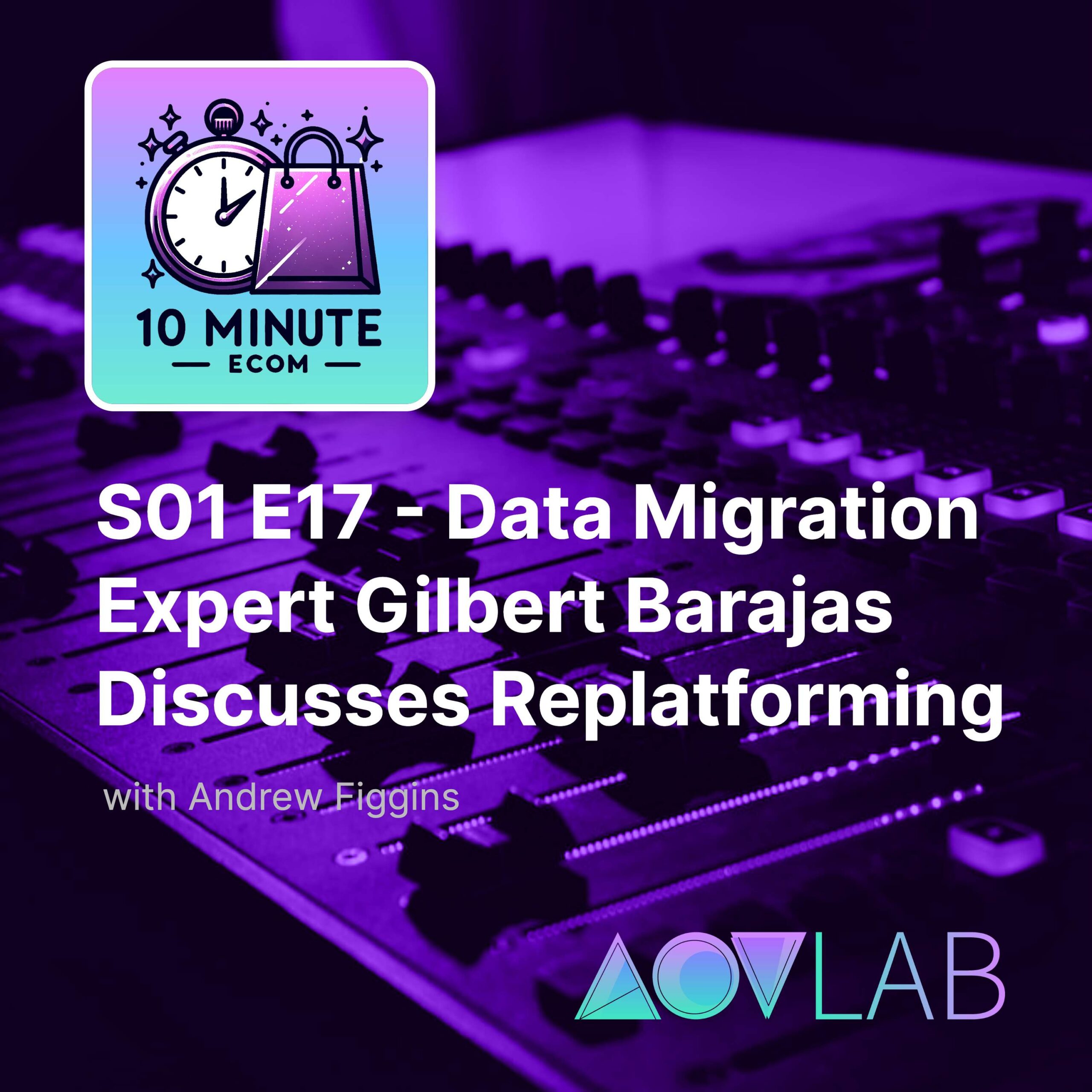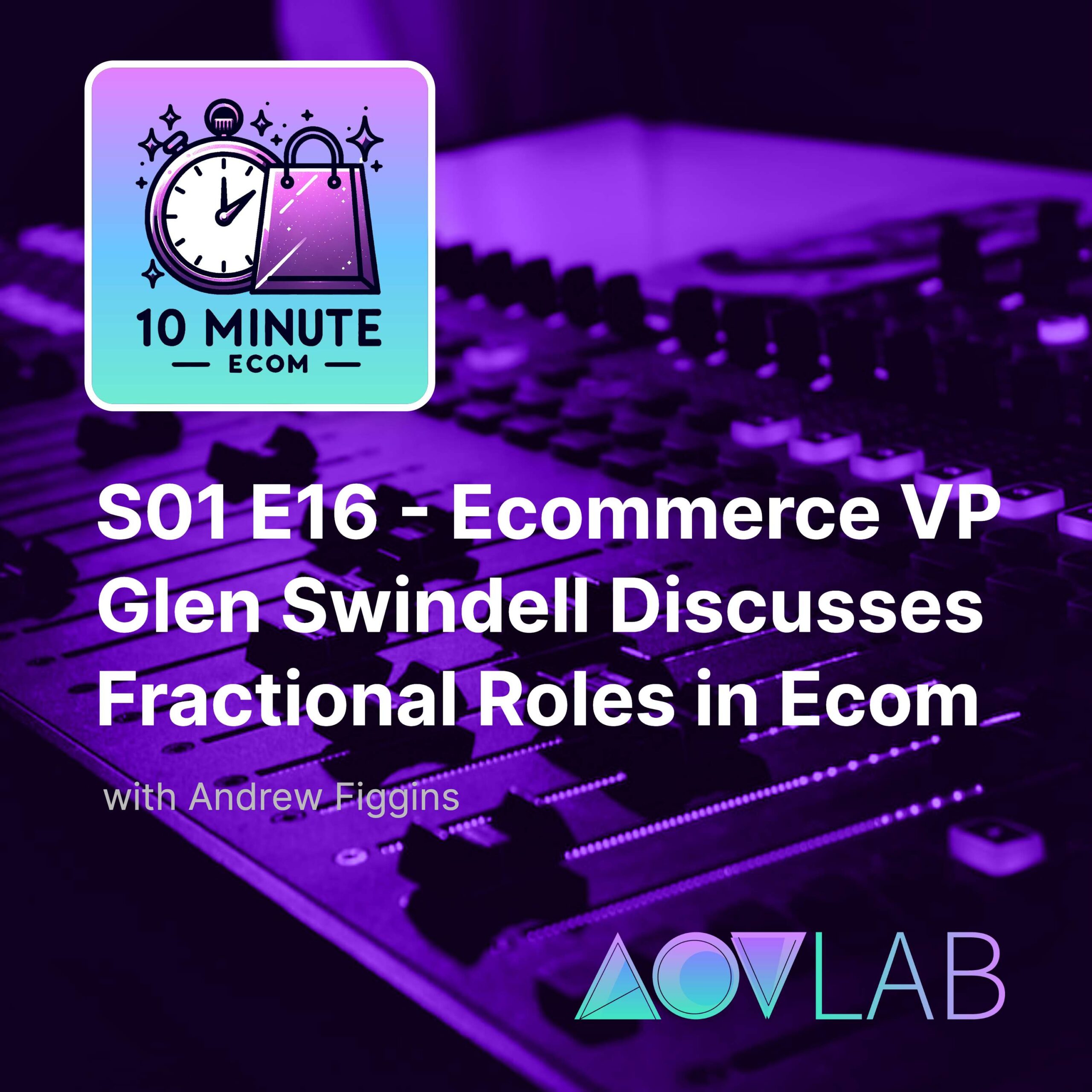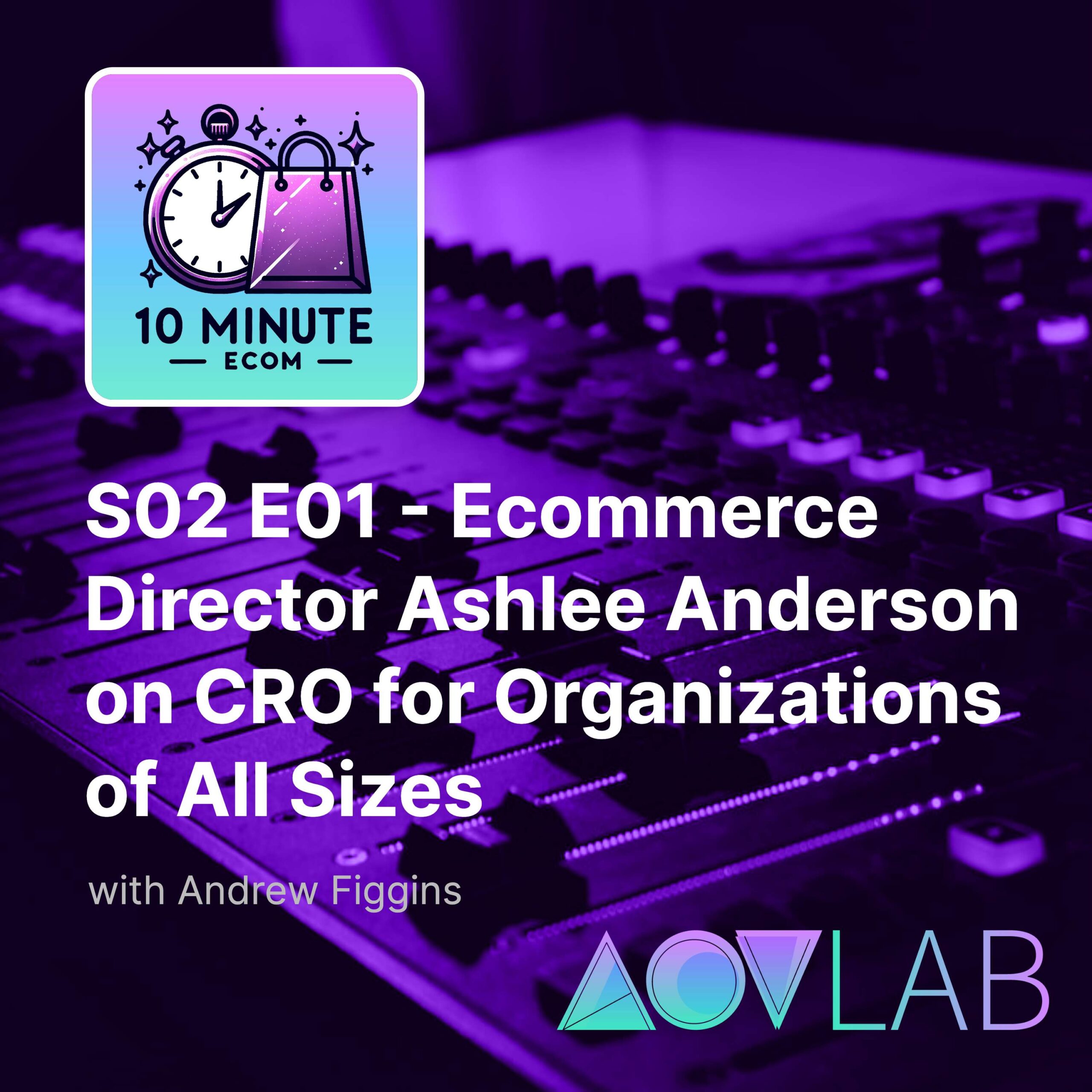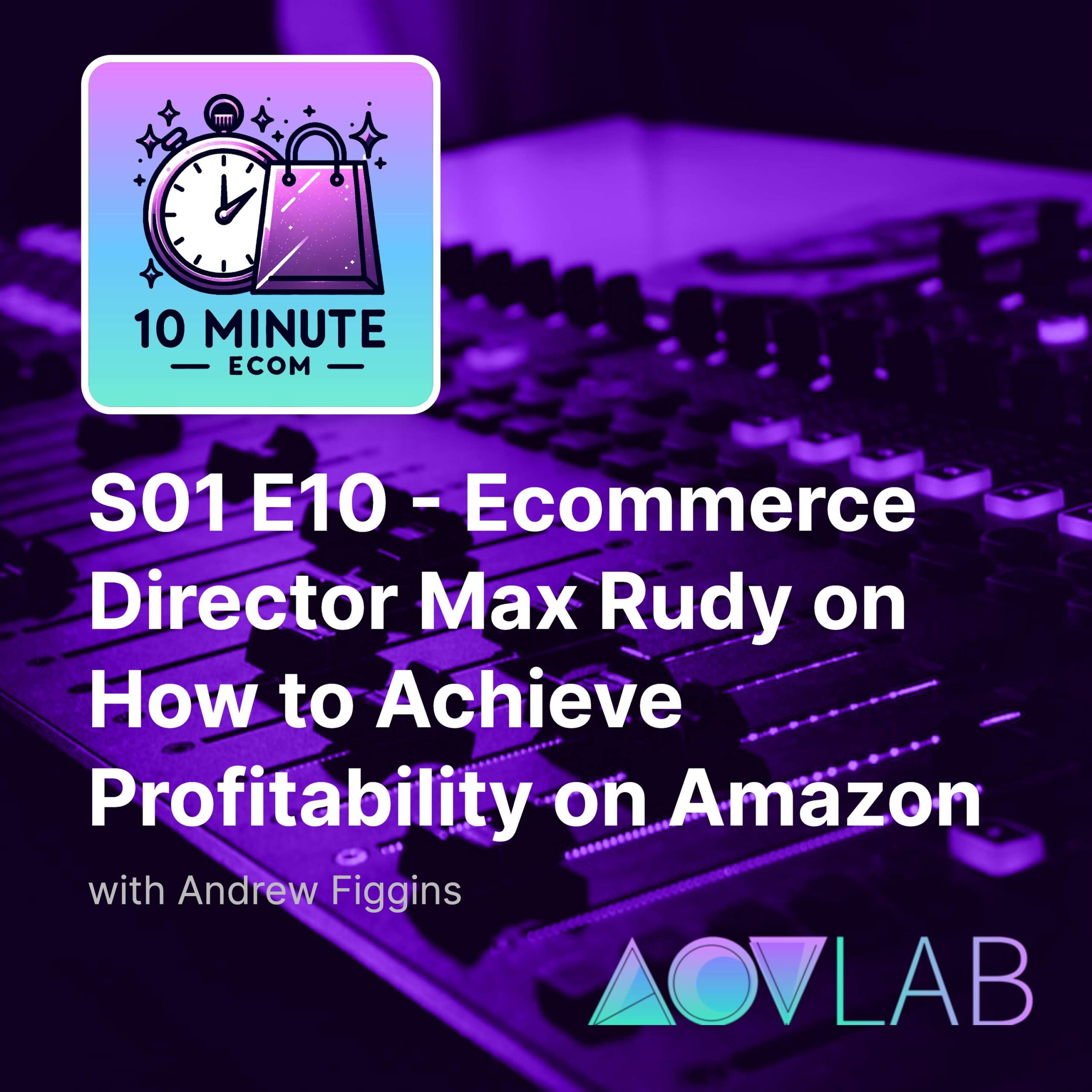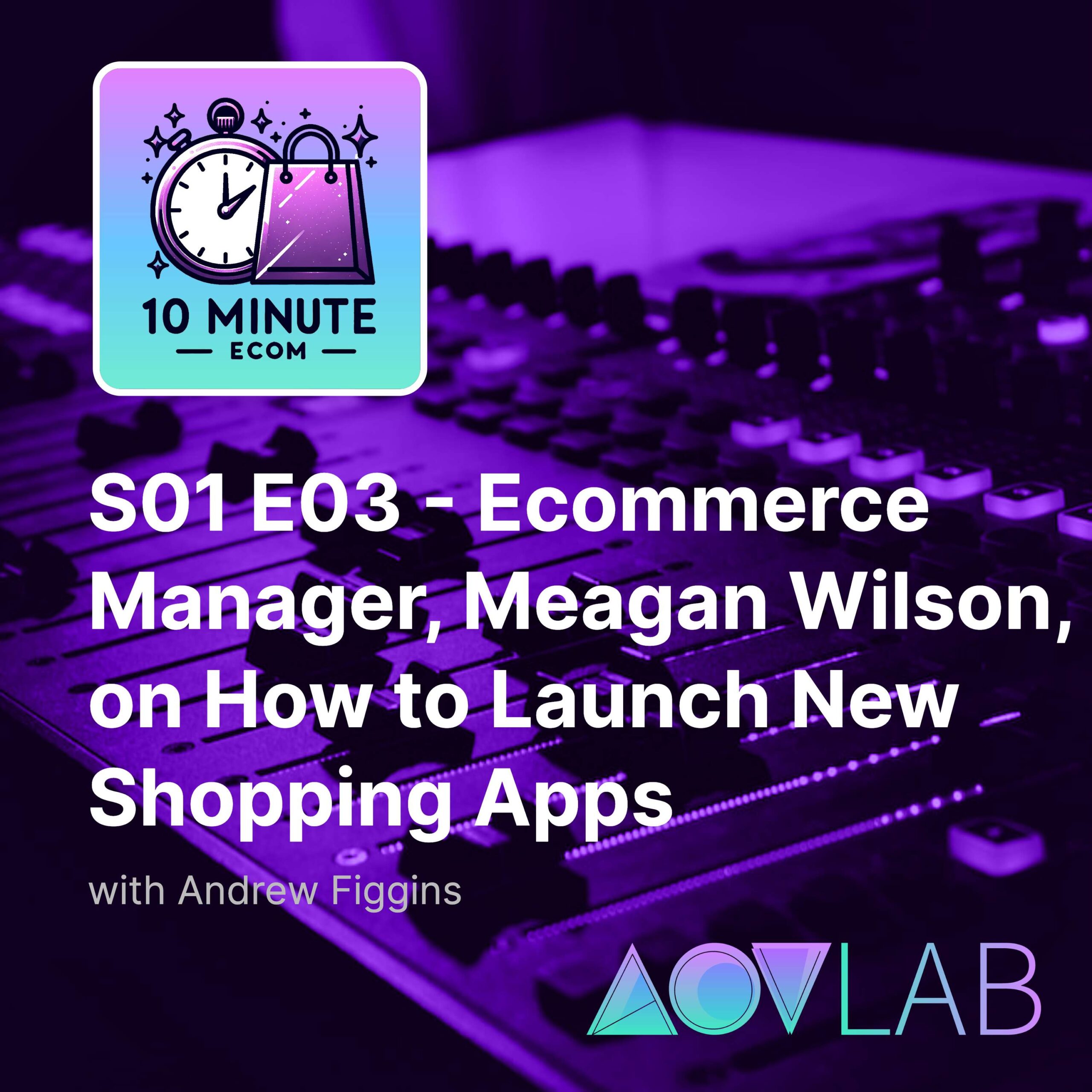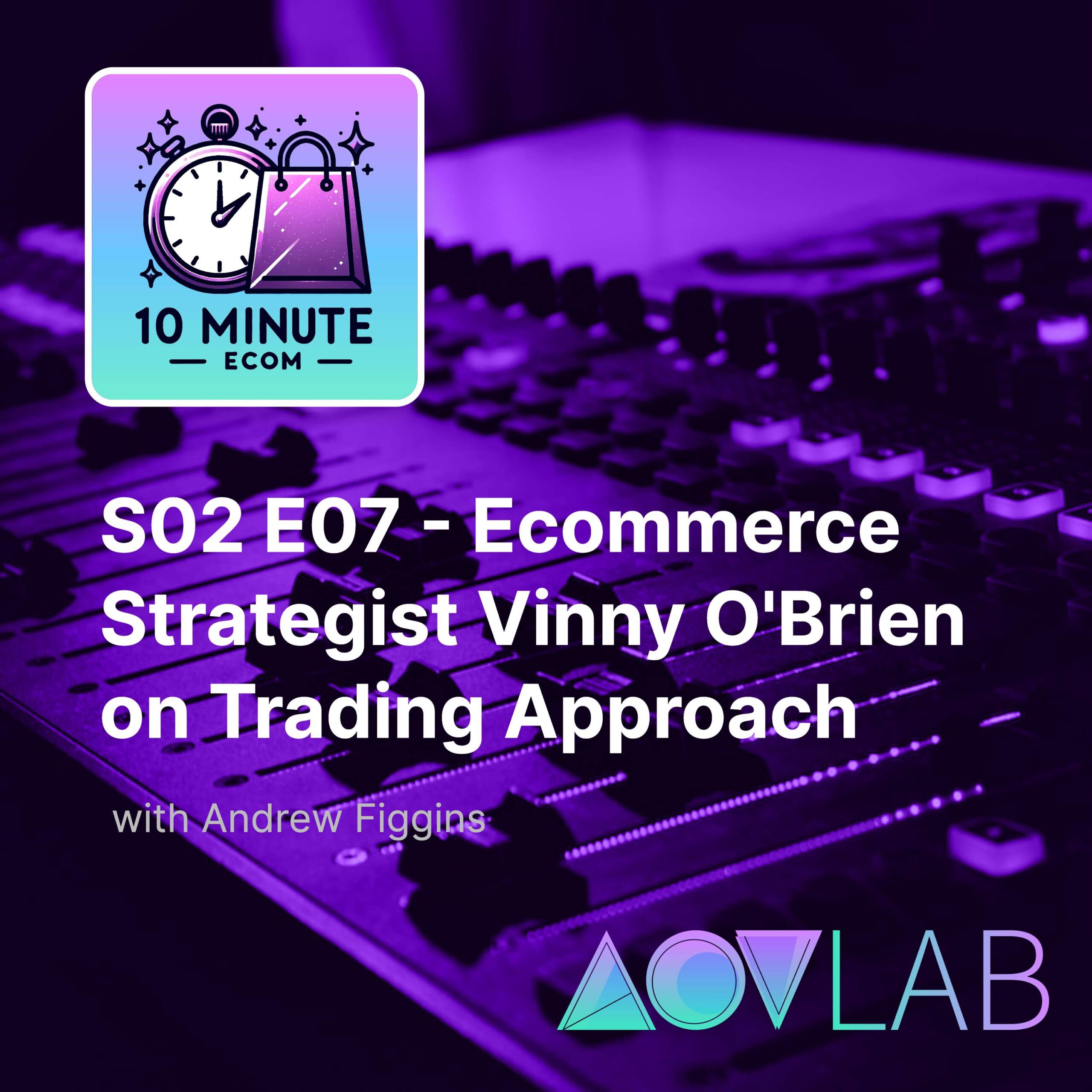Guest: Gilbert Barajas, Data Migration ExpertHost: Andrew Figgins, Founder, AOV Lab Episode Synopsis:Gilbert shares from his extensive experience in data migration and replatforming in his last role at BigCommerce, and his new role with several of his former colleagues. Transcript: [00:00:15] Andrew: Hello Ecommerce fans, and welcome to 10-Minute Ecom, an AOV Lab podcast. Every episode, we break down a new and different tactic that can help you improve your ecommerce KPIs (key performance indicators). I’m your host, Andrew Figgins, and like most of you, I am an e commerce professional. You may know me as the founder of AOV Lab, […]
View Full Transcript
Episode Transcript
[00:00:14] Speaker A: Ecommerce fans, and welcome to ten minute ECoM and AOV Lab podcast. Every episode, we break down a new and different tactic that can help you improve your ecommerce KPIs key performance indicators. I'm your host, Andrew Figgins, and like most of you, I am an e commerce professional. You may know me as the founder of AOV Lab, the former vp of digital product innovation at Scrubs and beyond, or as the former director of e commerce technology at Rural King. Today I'm excited to be talking to Gilbert Barrajas, an e commerce colleague that typically works behind the scenes, but he has emerged today to chat about his work in e commerce. I won't steal his slender. So anyway, Gilbert, what did you come on the show today to share with your ecommerce colleagues?
[00:00:59] Speaker B: Hi, I'm Gilbert Brahas from Softbacon Industries out of Austin, Texas.
One thing I've seen that works in ECOM is I'm going to be talking about data migration and replatforming today.
[00:01:10] Speaker A: Thank you, Gilbert. After the ad, we'll get right into the chat. Today's episode of ten minute ecom is brought to you by constructor IO. If your website isn't relying on constructor's machine learning algorithms to power your site search recommendations and quizzes, you are leaving money on the table. And I know what you're thinking. The host of this show, Andrew Figgins, not only can he host the show, but he can also read podcast ads that he wrote. Is this man proving right now that he's a double threat? Not a triple threat, just a double threat. You're not wondering that. Okay, back to constructor. I saw up close just how effective constructor's technology is. Having implemented it at scrubs and beyond, it's also trusted by Sephora. Life is good. Birkenstock, Ashley Badelbos, Petco, backcountry plow and hearth, and even target Australia.
Go to aov lab.com and click on vendor network to set up your 30 minutes Discovery call with constructor today.
And now back to the show.
Awesome, Gilbert. I'm so excited that you're here today. Right before we started recording today, I was relaying a painful story from my past around data migration. I was going from Magenta one to Magenta two. It went totally off the rails. And I'm convinced after chatting with you, that's just because we didn't know each other.
[00:02:35] Speaker B: Yeah. The thing about data migration and replatforming is a lot of people, they don't want to think about it until the very end. It's kind of something to think that this is just going to happen, that they're not going to have to plan. It's not something that needs to be brought in as early as possible when it comes to thinking whether you're just moving within, like you were talking about, I believe, Magento to Magento, which you would think that moving within the same platform would be the easy thing to do. We used to have to help people do a big commerce to big commerce, and you would think that would be just neat and clean to it. It's just never as neat and clean as you want because all these things are always built by multiple people over multiple generations of technologies. It doesn't always line up the way you think it is. One of the reasons you got to find someone who's actually done it before, not someone who just says that they think they can do it. That's the big factor here.
[00:03:24] Speaker A: And Gilbert, you mentioned that you've done this probably 10,000 times, maybe even 100,000 times in the past. Tell me a little bit about just.
[00:03:33] Speaker B: The nuts and bolts of it.
[00:03:34] Speaker A: A little bit like you're in there, you've got a catalog for an existing platform. You know, you need to move it to a new platform. What are some of the things that you're thinking about when you're first getting into that data and seeing how it looks?
[00:03:47] Speaker B: All right, we have the big three resources. So we're looking at your products, your customers and your orders. And those are the big three things that when your people are moving through platforms that they want to move. So that's the stuff that we got to start seeing is what exactly do you have when it comes to each one of these things? So if we're talking about products, I'm going be to breaking down all of the different tables that you have. Do you actually have options? Do you have variants?
What fields do you have? Are you using pricing for something else? Are you using special fields and custom fields, or what plugins are you using those for? Like, all those different things? What data do I actually have? Because that's what data migration is. It's a giant puzzle. And you start off with, what pieces do I have? You lay it out. You look at the picture over here, what it's supposed to look like when it's done, and then you just start piecing it together. And then when you're done, like, all right, what is missing between the two? And that's the devil in the detail. That's what you were talking about earlier. You don't know until you've done it before, oh, this thing is missing. Or if you don't have this thing, then this isn't going to work correctly. Or these things tie together in this interesting way. And it may all seem, oh, yeah, until you've actually run it through and laid it out and actually seen these things multiple times and seen where things go wrong or where this integration, people use a custom field and you can have two different prices and two different fields on the same product called price. And how does this tool even know which one? These things have been pieced together for years. Yeah, this is very interesting, knowing what you don't know. And most people don't know that stuff. They think, oh, yeah, it's very simple. I can just move this here. And I've had it so many times, people are like, I got a data guy, right? I got a data guy. He maintains our database and he's barely holding their Magento database together. And now you're asking him to figure out which platform we're going to move to. How does our data structure fit into the data structure, where we're moving? What integrations are we putting in between? How does the data need to be laid out in the source versus in the destination platform to make sure that the integrations fit appropriately? It's just a lot to be throwing on one person. That's not their job. Whereas I've done this tens, thousands, hundreds, thousands of times. Ecommerce used to, like I said, ingest entire old platforms, and then we moved into actually moving enterprise level big brands. Can't really talk about who, but moving big brands data to the point where these companies would not have moved on to the platform if it wasn't for the expertise of the team and what we were capable of doing?
It's a very specialized field, but it's one that people don't think about. But people move platforms in ecommerce a lot, and until they've done it once, then they realize, oh, man, last time I did it. I need to find an expert. Like, I need to find someone that can help out in this. Absolutely.
[00:06:25] Speaker A: Until I had really stepped in it, and so to speak, it hadn't occurred to me to focus on it as much as I needed to, for sure. Are there things that, aside from, of course, trying to find a data migration team and working with people who've done it before, some experts, are there things that if you're like an ecommerce director or ecommerce manager, are there things you can do to get your catalog ready for a migration?
[00:06:53] Speaker B: Yeah. Finding out exactly what you can export. We've had so many times where these people would go to their old platform and say, hey, what can I get from you? And they're like, here's a CSV with five fields on it. That's all you get. And they're coming over to us saying, oh, I need options, I need this. And I've got all these things and they're like, this is all I have is this single csV. So verifying where all your original data lives and what you actually have access to, because if you're on Magento, okay, you can probably get a copy of your entire SQL database, and that's the best method of moving it. But if you're on a shopify, you may have to go through individual exports and you're going to be limited to whatever the export template is. We used to be able to use the Shopify API to move people off, and then they changed their terms of service. And I've got some great war stories of Shopify operations team slowing us and blacklisting our ip address and stuff from moving data too fast and messing up their API. So just knowing exactly where your data lives, what you have access to, so that you come into the process knowing, all right, these are my expectations. So I only got this one csv with five files on it or five columns on it, and you might not going to get the best data migration. The quality and the quantity of the data is very important. So making sure that you have access.
[00:08:13] Speaker A: To that, that makes good sense to me. I wanted to ask you, there's a lot of e commerce platforms out there. There's some ones that have been around for a while. We've talked about them a little bit here today. Bigcommerce, Magento, a few others.
But do you feel like there's something with how the product data is structured or something in your role where you found that one platform makes more sense over another one?
[00:08:38] Speaker B: For example, usually the SaaS platforms make the most sense. When you have the self hosted platforms and you have like what we were talking about at the beginning, you have. All this started as a magento one point whatever and moved to one whatever and then moved to a two whatever. And we've had five different. The guy that originally put this database together, he retired ten years ago. And that type of stuff, that's where things start getting really complex. So your woo's woo is not as bad. They'll have plugins and whatnot, that kind of mess with the data a little bit and use it in weird ways. But Magentos are just really the beasts. Those are the ones where if you're on Magento and you're trying to move somewhere else, yeah, you really need some help because most people have no idea what's actually in their Magento database. People don't understand the relationship between the Magento app and the database. And they're like, oh, I've got this thing and it works this way. And I'm like, I'm looking at your database. I'm looking at the actual data that is not in here anywhere because you can have the actual front end edits to the Magento app that interpret the data in different ways. And that's not actually in here. You may have, because usually when we're doing the data migration, we just would have just the SQL file. We don't have actually have access to their specific Magento app and front end instance.
Those are some of the ones. But I think moving between the different SaaS platforms is not too bad. It's just what I talked about. What data do you actually have access to? Some of them will spit you out great CSVs that you can actually build complex products and customers and orders out of. And some of them, they give you the most bare bone stuff, like we used to try to do Yahoo, old Yahoo stuff. And it's just really weird. Like you'd have to, oh, for a customer, we'd have to go through their orders and pull the customer name out of an order because they wouldn't actually export the test. Just like weird stuff like that. So just knowing the data structure for each one and what you actually have access to and all that type of stuff, the more you know about it before you start engaging someone and the more you have an idea, because once again, you'll know what you don't know more about it at that point.
Absolutely.
[00:10:38] Speaker A: And you mentioned, Gilbert, that your team that was at Bigcommerce, you were there for six, seven years. You guys were almost like this in house agency that took care of the data migration on behalf of Bigcommerce and the clients, whether, like you said, there's some big name companies or smaller companies there. But we were chatting before the recording today, and what I like, and I don't know how much you can talk about this quite yet, but you've taken that model of you and your team and what you guys do, and you've taken that outside big ecommerce now.
[00:11:12] Speaker B: Yes, this next year, we're going to be doing a little starting with little consulting specifically on replatforming, me specifically. I'm going to be doing a lot of consulting. I got a couple of clients lined up where they're going to be a spirit guiding and guiding them through the process. But if that moves into actual need of transfers, then actually, I've got some horsepower lined up to start moving that in the next year once we get the projects rolling. But, yeah, it's something that we have when we actually started doing the math. Sit down and do the math. I worked at Bigcommerce for seven years. One of the other guys actually been there for 13 years, another guy for six, another for five. So between us, we got 30 some odd years of data migration experience. We moved literally, like, hundreds of thousands of stores. There's probably no one in the world who has done more data migration specifically for ecommerce than the four of us. Yeah, this is world class expertise, and we got to need to share this with the world, not just what we were doing. Here at Bigcommerce, we've made apps and stuff, self service apps that hold. This is some inside baseball. But we actually had entire agencies that messaged us and were like, hey, you made a change to this app. And our entire business model was just using your free app to move people from Shopify to ecommerce or whatever. Because we had from Shopify to ecommerce, from woo to ecommerce, from magento to ecommerce, we had seven or eight different apps that would move people from whatever, and they're pretty self serviced. And we were like, wait, hold on. People are basing their entire business around just the self service apps that we created? No. Okay, we got to do more. We got to do more of this. So, yeah, that's going to be my journey in 2024. And I said, I got a couple of guys that I'm going to be dragging along with me.
[00:12:46] Speaker A: Awesome, man. We certainly wish you well, and it's good to talk to an expert here on ten minute EcOM. So I thank you for coming by today. Before we head out, because it is a brief show, is there anything else you'd like to share with your colleagues in ECOM?
[00:13:02] Speaker B: Yeah, I definitely feel that ecommerce is the absolute future.
The world in general has become an interesting place. I was actually seeing on the news this morning about rampant looting in certain places and stores entirely shutting down and be like, we're just not going to have physical locations anymore. So I've just seen more and more of that. With the world becoming such a globalized place that ecommerce is the absolute future. And if you don't have your hand in it in some way or another, whether you're selling something online, helping people sell something online, if you're not involved in it somehow, another, then you're missing out on an extremely huge opportunity because most things are still done through retail. It's ecommerce is the absolute future. So that's my opinion and why I'm still sticking in it after all this time.
[00:13:44] Speaker A: Excellent. Thanks so much again for coming on, Gilbert.
[00:13:47] Speaker B: Appreciate it. Yeah, I appreciate it. Thanks for having me this great time.
[00:13:50] Speaker A: Well, we have hit that ten minute mark, so that's a wrap for today's episode. I want to again thank our guest Gilbert Grass. Bear with me today. I have a very lengthy list of ways that you can support the show. If you have a moment, be sure to subscribe like or follow the show on Apple Podcasts, Spotify, Amazon Music, Audible, Google Podcasts, or wherever it is that you listen. You can also rate and review the show inside your podcast app. If you have a tactic that you'd like to talk about on an upcoming episode, reach out to Humans at AoV lablab.com and let me know. You can also go to AoV Lab.com and check out more episodes of the show as well as our vendor network. If you can spare a half hour to take a demo of any of our sponsors, it'll be worth your time. I've hand selected a set of peer tested, proven technologies including optiversal, constructor, thrive, ecommerce, as well as Espresso and Shopbox AI, who we are helping to introduce to us based retail and e comm brands and professionals. I hope you enjoyed this episode of the show. Until next time, this is Andrew Figgins signing off and saying have a good.
